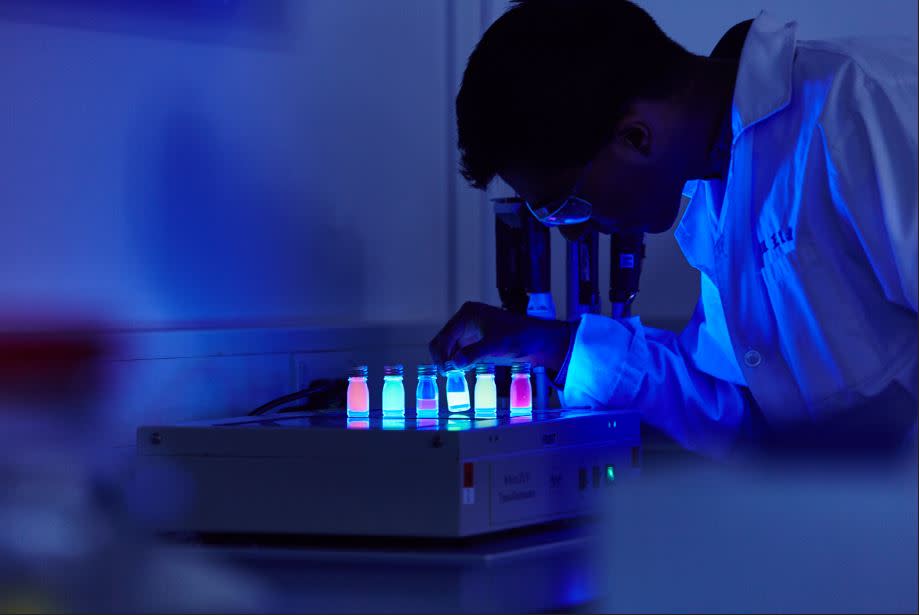A Global Crisis: A Catalyst For Innovation & Creativity
By Bruntwood SciTech

In the midst of a global crisis, this year’s World Creativity and Innovation Day (WCID) couldn’t be more timely. Led by the United Nations to raise awareness of the role of creativity and innovation in all aspects of human development, the campaign focuses on innovation in problem solving.
The COVID-19 crisis has already had an immediate impact on the world. The way businesses operate, the way we work and the way we live has changed monumentally and today’s themes of creativity and culture; economic growth; and new momentum are now even more instilled at the forefront of people’s minds.
The world is rapidly attempting to find solutions. Not only are there attempts to discover cures and vaccines, but also develop specialist equipment. WCID encourages multidisciplinary thinking and recently we have seen this in abundance as collaborations have formed to create necessities such as ventilators, and even build whole hospitals in weeks rather than years.
It is often the impact of a global phenomenon, crisis or challenge that breeds this sort of rapid innovation, and that’s because everyone recognises the need for collaboration. Organisations and teams from a range of backgrounds and disciplines pull together to pool knowledge, talent and resources. We’re seeing this happening right now across the UK with the government, the NHS, academia and the private sector mobilising together to find common solutions.
Major global events also act as a catalyst to break down the typical barriers to innovation and ensure that we arrive at solutions now, rather than later. Economic growth strategies - funding specifically - is a case in point.
The UK government recognises this and has established a new £20 million fund for business, delivered through Innovate UK, with the sole purpose of supporting one thing: projects that develop innovative and ambitious ideas to help key industries and services affected by the pandemic. Innovative industries can, and will, transform sectors and economies and the state's intervention will enable quicker products to market, alongside creating and retaining jobs.
Having access to funding is vital as the UK has some of the finest talent and innovative minds, but it will not mean anything if they do not have the capital to fuel the development of their ideas. Take the Ventilator Challenge UK - a consortium of global manufacturers from the automotive sector, including Rolls Royce, Airbus and a host of UK-based F1 teams who have turned their collective engineering know-how and manufacturing might from cars to the production of ventilators to immediately scale-up supply in line with demand. Putting aside competition and collaborating, Dyson has also set about joining the movement to accelerate innovation - designing and developing its own ventilator to supplement the shortage of life-saving equipment. Neither of these things would have happened without the world being faced with such a seismic global event - multidisciplinary thinking at it’s best.
It’s also not just large corporations who are innovating and creating; this is transpiring across all sizes and stages of businesses. Startups and scaleups are rapidly increasing their product availability, creating new products or service lines, or pivoting their business to help the cause; from Dicey Tech’s 3D printed PPE face shields to Northcoders’ eight-week fully remote start-from-scratch coding course and Civico’s highly secure and auditable public sector video and audio conferencing systems.
But it’s not just the private sector and big business working in this way. The UK government saw a unique window of opportunity and engaged universities, hospital trusts and big pharma to quickly increase capacity and capability for diagnostic testing - creating a network of ‘Lighthouse laboratories’ including one in the North West at Alderley Park. This project, led by the Medicines Discovery Catapult pulls together new infrastructure, facilities and talent to launch this critical facility at scale and speed.
According to the UN, culture is an “essential component” to creativity and innovation. Today, across the world, we’re seeing a level and scale of innovative culture that has never been seen before. Competition and conflict have been replaced by a culture of collaboration. Anyone can have an idea that sparks a solution, but there’s a genuine need for good-will and determination to make it a reality.